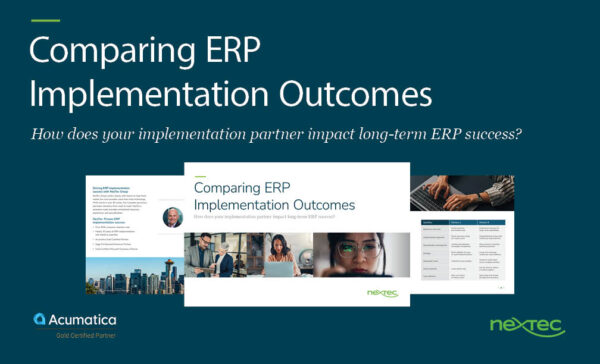
The decision to invest in an enterprise resource planning (ERP) system is one of the most important strategic decisions any small or mid-sized business (SMB) will make. Given the size and scale of the technology investment, growing businesses naturally have many questions about implementing ERP software. To help you better understand the benefits of ERP and what’s involved in an ERP implementation, we’ve put together a FAQ with answers to the most frequently asked questions we hear from businesses.
1. What are the benefits of ERP software?
ERP software connects and organizes all areas of your business. It replaces separate, disconnected systems and acts as a “single source of truth” by storing and synchronizing company-wide data, making it possible for each team member to access the same updated, accurate information at the same time. The result? A real-time 360-degree view of your business and the following benefits:
- Increased efficiency
- Streamlined workflows
- Reduced redundancies
- Improved collaboration
- Cost-effective compliance
- Better customer service
By implementing the right ERP software, you can overcome operational bottlenecks, reduce manual effort and costs, and make data-driven decisions faster.. You can also produce more accurate forecasts based on complete operational data (current and past). According to G2, 88% of organizations feel their ERP implementation has helped them succeed.
2. Why is industry-specific ERP software superior to generic ERP software?
As the name suggests, industry-specific ERP solutions are designed with an industry’s unique needs in mind by experts who thoroughly understand your company’s needs. Selecting an ERP purpose-built for your industry will help you manage your specific challenges and pain points more effectively. Compared to generic or ‘off the shelf’ ERP, accounting, or business management software that requires extensive customizations to address challenges inherent to your business, industry-specific ERP solutions come equipped with the out-of-the-box tools you need to ensure success.
For example, software designed for the manufacturing industry will come equipped with advanced functionality manufacturers need to boost efficiency. Features that support make-to-stock, make-to-order, engineer-to-order and batch processing help business leaders create more efficient production methods. Applications that help increase throughput and reduce downtime ensure companies have the tools needed to optimize their planning and scheduling. Manufacturing-specific ERP solutions also help you take control of your inventory and supply chain.
3. Is my company ready for an ERP solution?
As your business grows, your software should provide you with the features you need to scale, compete, and thrive. If it doesn’t, then you may be hindering future growth and long-term success. Ideally, a software system will help you make notable gains in efficiency, productivity, and cost savings. In our experience, virtually all SMBs reach a point where they can no longer effectively manage their business with basic accounting software or generic ERP solutions.
Here are a few signs it’s time to replace your accounting software:
- Lack of scalability: Systems that don’t grow alongside your company without incurring additional costs and complications can severely limit potential.
- Data silos: Accounting software that doesn’t integrate with other mission-critical business systems can create unreliable data and limit your insights.
- Inefficient workflows: If your team is spending more time on manual tasks and workarounds than on actual production, you could be losing money and yielding advantage to your competitors.
Check out a side-by-side comparison of standalone accounting systems and Cloud ERP software.
4. How is an ERP solution implemented?
An ERP is typically implemented in one of two ways: on-premises or via the cloud. There are advantages and disadvantages to both and depend on your unique company’s requirements. At NexTec, we typically recommend a cloud deployment for a number of reasons.
One reason is how quick, easy and affordable it is to migrate from an outdated solution to a modern cloud ERP. Instead of tediously installing costly hardware in a physical location and hiring an entire IT staff to update and maintain the hardware, you can easily and quickly implement a cloud-based ERP solution—no hardware needed. Additionally, your ERP partner shoulders the upgrade, maintenance and security responsibilities.
Another reason we recommend a cloud deployment is because it offers you and your team members remote access to the system and to your critical business data from anywhere and at any time. Should a natural disaster or human-induced threat arise, your data and workflows are safely stored and accessible in the cloud at all times.
Here are a few more reasons to consider a cloud deployment:
- Seamless integrations: Most Cloud ERP solutions enable businesses to seamlessly integrate with third-party applications, empowering them to extend the ERP solution’s functionality and allowing them to access and synchronize data from those applications.
- Automatic updates and upgrades: Updates and upgrades within a Cloud ERP solution can be scheduled to occur automatically, making it a painless procedure and providing you with the latest version without interrupting business as usual.
- No software licensing audits: With a cloud-based platform, the days of undergoing a tedious and sometimes expensive software licensing audit are over. Your monthly subscription fee covers all licensing needs.
5. Which departments are involved in an ERP implementation?
An ERP solution is designed to integrate all aspects of your business, so in short, all departments are or should be involved. An ERP’s strength lies in integration. As noted, data is collected from every department and feeds into a central location, impacting daily operations, from the departmental level all the way up to the C-suite. While it’s common for finance, accounting, or operations to initiate the search for a new ERP, the benefits of an ERP deployment will be felt across the organization.
It’s important to consider how the ERP system you choose will affect every individual in each department. And just as important is the need to include every team member in the decision by asking what their concerns may be and what features and functionality they would like the new ERP solution to provide.
The right solution should have a positive impact on all employees, regardless of their position in the company
6. Will ERP software training be required for my staff?
Adopting a new ERP solution is considered a major organizational change and is therefore subject to the same potential change management challenges of any large-scale technology initiative. As such, training will be required for all levels of staff to get the most out of the solution. Depending on the ERP solution you choose, training can be easy and a part of the overall cost or it may be an additional expense. It’s critical you research this aspect of an ERP implementation before making your final ERP solution selection.
7. What is the potential ROI of an ERP implementation?
According to research conducted by Ultra Consultants, companies implementing ERP systems experience a return of more than $7 for every dollar spent on the ERP project. In a report titled “ERP pays for itself – fast”, Nucleus Research found that, on average, companies implementing modern cloud-based ERP achieved a positive return on investment in just 16 months with a 200% ROI.
End-to-end visibility into your operations allows you to make better, faster decisions that ultimately maximize productivity and profitability. Eliminating bottlenecks through automated processes means you’re meeting—and exceeding—production and service goals. And with streamlined processes, every department benefits from increased efficiency via cost-effective workflows and accurate real-time data.
As you’ll see with question #8, it’s critical you develop a well thought out project plan during implementation. A plan will help you set realistic goals and ensure the project stays on time and within budget and will also help make the ROI more apparent.
8. How should we prepare for an ERP implementation?
Most ERP implementations are completed in stages and based on a defined plan that is created prior to the implementation process beginning. However, before this step, you’ll need to ensure you do the following:
- Assemble a project team that understands the features, functions and requirements that are essential to the success of your company.
- Conduct a business process review to help identify areas that would benefit from a connected business management system.
- Select the right solution based on your company’s specific requirements and processes.
9. What will be required of our staff/company?
Implementing an ERP solution requires buy-in from everyone in the organization. As such, it’s vital you communicate the vision across the whole organization so your team is aware of what will happen and why, starting before the selection process. Create opportunities throughout the implementation process for staff to take part, such as providing early training or discussing with them their thoughts on how the ERP should function. Ensure the proper training by putting low-priority projects on hold so staff members have time to focus on the ERP implementation and learn the new software.
10. What should we expect from our ERP reseller?
Choosing the right ERP implementation partner is every bit as important as choosing the right ERP software. Not all ERP resellers are created equal, and it’s critical that you find a partner with the experience and industry expertise required for implementation success. Look for a reseller with team members that are familiar with your industry so they’re able to better understand your business and speak your language.
At NexTec, we have three decades of ERP consulting experience and are proud of our +90% customer retention rate. We implement best practices, suggest ways to make your operations run smoother, and guide your team through the ERP selection process, implementation, go live and beyond. In our experience, we’ve found few Cloud ERP solutions that can compare to Acumatica Cloud ERP.
As a gold-certified Acumatica partner and 2025 Acumatica VAR Partner of the Year, we can attest to the fact that Acumatica offers a comprehensive, flexible, affordable, and user-friendly Cloud ERP solution . G2 recently named Acumatica a Top 100 Global Software Company (out of 150,000+ vendors). Acumatica secured #1 rankings in 14 ERP categories and was recognized for Best Usability, Best Results, and Most Likely to Recommend.
“Acumatica is very easy to use, which means we don’t have to explain something 25 thousand times,” says Francisco Callegari, CIO at Industry Specialty Services (ISS). “We can show employees what they need to know with just a few clicks.” ISS CEO James Craig adds this about the NexTec experts who helped implement Acumatica “They did a great job of training and getting people to understand how the system works, which drove adoption.”
Read Our Free Guide:
Comparing ERP Implementation Outcomes

About NexTec Group
NexTec Group is one of North America’s largest and most experienced technology consulting firms, specializing in industry-specific solutions for mid-sized organizations. For thirty years, NexTec has been a trusted partner to businesses, delivering, implementing, and supporting the core Enterprise Resource Planning (ERP) and Business Intelligence (BI) solutions they need to scale and grow.
With seasoned consultants from coast to coast, and a premium portfolio of innovative business management solutions including Acumatica and Sage X3, we help you get the most out of your technology investments. Our over 90% customer retention rate is a testament to the lasting, impactful relationships we build with our clients.
To learn more, visit www.nextecgroup.com or follow us on LinkedIn.




